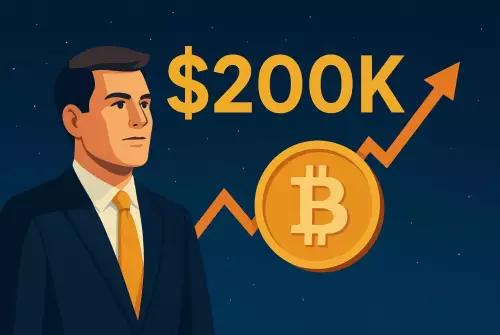 |
|
 |
|
 |
|
 |
|
 |
|
 |
|
 |
|
 |
|
 |
|
 |
|
 |
|
 |
|
 |
|
 |
|
 |
|
近年、中央銀行や金融機関から、ビットコインとその金融政策への潜在的な影響に焦点を当てた一連の研究が増えています。

A Bitcoin change store is seen in Tel Aviv, Israel on December 30, 2022. (Photo by Beata Zawrzel/NurPhoto via ... [+] Getty Images)
2022年12月30日、イスラエルのテルアビブにあるビットコイン交換ストア。(写真:Beata Zawrzel/NurPhoto via ... [+] Getty Images)
In recent years, a growing body of research has emerged from central banks and financial institutions, focusing on Bitcoin and its potential impact on monetary policy. These studies, issued by organizations such as the Minneapolis Federal Reserve, the European Central Bank (ECB), and the International Monetary Fund (IMF), highlight a key theme: the disruptive nature of Bitcoin and other cryptocurrencies could limit the ability of central banks to perform their traditional role in managing economies. Advocates have argued that Bitcoin could be an alternative to central banking, are central banks finally recognizing Bitcoin as a potential threat?
近年、中央銀行や金融機関から、ビットコインとその金融政策への潜在的な影響に焦点を当てた一連の研究が増えています。ミネアポリス連邦準備制度、欧州中央銀行(ECB)、国際通貨基金(IMF)などの組織が発表したこれらの研究は、ビットコインやその他の仮想通貨の破壊的な性質が中央銀行の能力を制限する可能性があるという重要なテーマを浮き彫りにしている。経済を管理する上での伝統的な役割を果たすためです。支持者らはビットコインが中央銀行の代替手段になり得ると主張しているが、中央銀行はついにビットコインを潜在的な脅威として認識したのだろうか?
Can Bitcoin Lead To Inequality?
ビットコインは不平等をもたらす可能性があるか?
The European Central Bank’s researchers have published two papers on Bitcoin, both of which offer strikingly different perspectives. The first, published in the wake of the FTX collapse in 2022 while Bitcoin was trading at $16,000 - titled “Bitcoin’s Last Stand” - portrays Bitcoin as being a failed monetary experiment in its final death throes. In 2024, with Bitcoin trading at nearly $70,000, the same authors at the European Central Bank published a paper acknowledging a different reality.
欧州中央銀行の研究者はビットコインに関する2本の論文を発表したが、どちらも驚くほど異なる視点を提供している。最初の本は、ビットコインが16,000ドルで取引されていた2022年のFTX崩壊を受けて出版されたもので、「ビットコインの最後の抵抗」と題され、ビットコインが最後の死の苦しみに陥った金融実験として失敗したものとして描かれている。 2024年、ビットコインが7万ドル近くで取引される中、欧州中央銀行の同じ著者らが異なる現実を認める論文を発表した。
This latter paper argues that Bitcoin’s existence and continued appreciation has a significant impact on wealth distribution. According to the paper, when Bitcoin's price rises, early Bitcoin holders get wealthier. However, since Bitcoin doesn't produce anything or increase economic output, this increased wealth and consumption by early holders must come directly from reduced consumption by everyone else in society.
後者の論文では、ビットコインの存在と継続的な上昇が富の分配に大きな影響を与えていると主張している。同紙によると、ビットコインの価格が上昇すると、初期のビットコイン保有者はより裕福になるという。しかし、ビットコインは何も生み出さず、経済生産を増加させないため、初期保有者によるこの富と消費の増加は、社会の他の全員による消費の減少から直接来ているに違いありません。
This means that when early Bitcoin holders spend their profits on goods and services, they are using purchasing power that has been taken from non-holders and people who bought Bitcoin later. This reduction in people’s purchasing power happens even if Bitcoin's price keeps going up forever and even impacts individuals who don’t buy Bitcoin at all.
これは、初期のビットコイン保有者が利益を商品やサービスに費やすとき、非保有者や後でビットコインを購入した人々から奪った購買力を使用していることを意味します。この人々の購買力の低下は、ビットコインの価格が永遠に上がり続けたとしても起こり、ビットコインをまったく購入しない個人にも影響を及ぼします。
The key insight is that Bitcoin wealth doesn't create new economic value - it just redistributes existing wealth. Even in the most optimistic scenario where Bitcoin's price keeps rising, it makes early holders richer only by making everyone else poorer in relative terms. The authors argue this is different from gains in stocks or property values, which can reflect and contribute to actual increases in economic productivity and output. With Bitcoin, the gains are purely redistributive since Bitcoin itself doesn't produce anything or increase economic capacity.
重要な洞察は、ビットコインの富は新たな経済価値を生み出すのではなく、既存の富を再分配するだけであるということです。ビットコインの価格が上昇し続けるという最も楽観的なシナリオであっても、初期の保有者がより裕福になるのは、相対的に他の人がより貧しくなるだけである。著者らは、これは経済生産性や生産高の実際の増加を反映し貢献できる株式や不動産価値の上昇とは異なると主張している。ビットコインの場合、ビットコイン自体は何も生み出さず、経済能力を増加させないため、利益は純粋に再分配です。
This ECB viewpoint mirrors a longstanding critique made by Bitcoin proponents regarding central banks. The Cantillon effect, named after 18th-century economist Richard Cantillon, suggests that central banks, by printing money, disproportionately enrich those who are closest to the money supply (such as banks and wealthy individuals), while the rest of the population sees diminished purchasing power. When new money enters the economy, it doesn't affect all prices simultaneously - instead, the first recipients of the new money (typically financial institutions) can spend it before prices rise, while those furthest from the money supply (typically ordinary citizens) only experience the resulting inflation.
この ECB の見解は、ビットコイン支持者が中央銀行に関して行ってきた長年の批判を反映しています。 18世紀の経済学者リチャード・カンティヨンにちなんで名付けられたカンティヨン効果は、中央銀行が紙幣を印刷することで、貨幣供給に最も近い人々(銀行や富裕層など)を不釣り合いに富ませる一方で、残りの国民の購買力が低下することを示唆しています。力。新しい貨幣が経済に流入しても、それはすべての価格に同時に影響を与えるわけではありません。代わりに、新しい貨幣の最初の受取人(通常は金融機関)は価格が上昇する前にそれを使うことができますが、貨幣供給から最も遠い人々(通常は一般国民)だけがそのお金を使うことができます。その結果生じるインフレを経験してください。
Tesla Billionaire Elon Musk Declares ‘Financial Emergency’ As $35.7 Trillion ‘Debt Bomb’ Primes A Bitcoin Price Boom To Rival Gold
テスラの億万長者イーロン・マスク氏、35.7兆ドルの「債務爆弾」がビットコインの価格急騰をライバルの金に呼び水として「金融非常事態」を宣言
Trump Vs. Harris 2024 Polls: Harris Leads In Latest 2 Surveys—As Most Polls Show Razor-Thin Race
トランプ vs.ハリス 2024 年世論調査: 最新 2 つの調査でハリスがリード—ほとんどの世論調査で非常に薄い人種が示されている
iPhone 17 Pro Max Design Upgrade: New Look Predicted In Latest Leak
iPhone 17 Pro Maxのデザインアップグレード:最新のリークで新しい外観が予測される
The redistributive properties of monetary policy have been widely documented and debated. Central banks themselves have investigated whether quantitative easing - where central banks purchase financial assets to boost the economy - has increased wealth inequality. By purchasing assets like government bonds and mortgage-backed securities, quantitative easing tends to drive up asset prices, benefiting those who already own such assets. This creates a similar redistributive effect to what the ECB criticizes in Bitcoin: wealth is transferred from one group to another without necessarily creating new economic value.
金融政策の再分配特性は広く文書化され、議論されてきました。中央銀行自体が、景気を刺激するために中央銀行が金融資産を購入する量的緩和が富の不平等を増大させたかどうかを調査している。量的緩和は国債や住宅ローン担保証券などの資産を購入することによって資産価格を押し上げる傾向があり、すでにそのような資産を所有している人々に利益をもたらします。これは、ECBがビットコインで批判していることと同様の再分配効果を生み出します。つまり、必ずしも新たな経済価値を生み出すことなく、あるグループから別のグループに富が移転されるのです。
Can Bitcoin Jeopardize Monetary Policy ?
ビットコインは金融政策を危険にさらす可能性があるか?
A recent working paper from the Minneapolis Fed looks at Bitcoin from a different angle. The paper argues that when people can freely buy and hold Bitcoin (or similar "useless pieces of paper"), it becomes harder for the government to run consistent budget deficits. Normally, the government can spend more than it takes in through taxes by selling government bonds. For this to work, these bonds need to stay valuable. But when Bitcoin exists as an alternative, something tricky happens - no matter what smooth, predictable policies the government tries to use, the government might get forced into a situation where it has to spend only what it collects in taxes. The researchers found only two ways to fix this problem: either completely ban Bitcoin, or put a specific tax on owning it. It's worth noting that this isn't about Bitcoin's price or how many people use it - just its mere existence as something people can buy creates these complications for government deficit spending.
ミネアポリス連銀の最近の研究報告書は、ビットコインを別の角度から考察している。同論文は、人々がビットコイン(あるいは同様の「役に立たない紙切れ」)を自由に購入・保有できるようになると、政府が一貫して財政赤字を抱え続けることが難しくなると主張している。通常、政府は国債を売却することで、税金による収入よりも多くの支出を行うことができます。これが機能するためには、これらの絆が価値のあるものであり続ける必要があります。しかし、代替手段としてビットコインが存在すると、厄介なことが起こります。政府がどのようなスムーズで予測可能な政策を使おうとしても、政府は税金で集めたものだけを支出しなければならない状況に追い込まれる可能性があります。研究者らは、この問題を解決する方法は 2 つしかないと発見しました。それは、ビットコインを完全に禁止するか、ビットコインの所有に特定の税金を課すかのいずれかです。注目に値するのは、これはビットコインの価格やビットコインを使用する人の数に関するものではなく、単に人々が購入できるものとしてビットコインが存在するだけで、政府の赤字支出にこうした複雑さが生じるということである。
免責事項:info@kdj.com
提供される情報は取引に関するアドバイスではありません。 kdj.com は、この記事で提供される情報に基づいて行われた投資に対して一切の責任を負いません。暗号通貨は変動性が高いため、十分な調査を行った上で慎重に投資することを強くお勧めします。
このウェブサイトで使用されているコンテンツが著作権を侵害していると思われる場合は、直ちに当社 (info@kdj.com) までご連絡ください。速やかに削除させていただきます。
-

-

-

-

-

- 暗号億万長者:適切な投資で金融の自由のロックを解除します
- 2025-09-27 20:00:16
- 暗号億万長者の台頭を探索し、ビットコインハイパー、リネア、マキシドージの潜在的な投資機会を発見してください。
-

-

-

-






























































